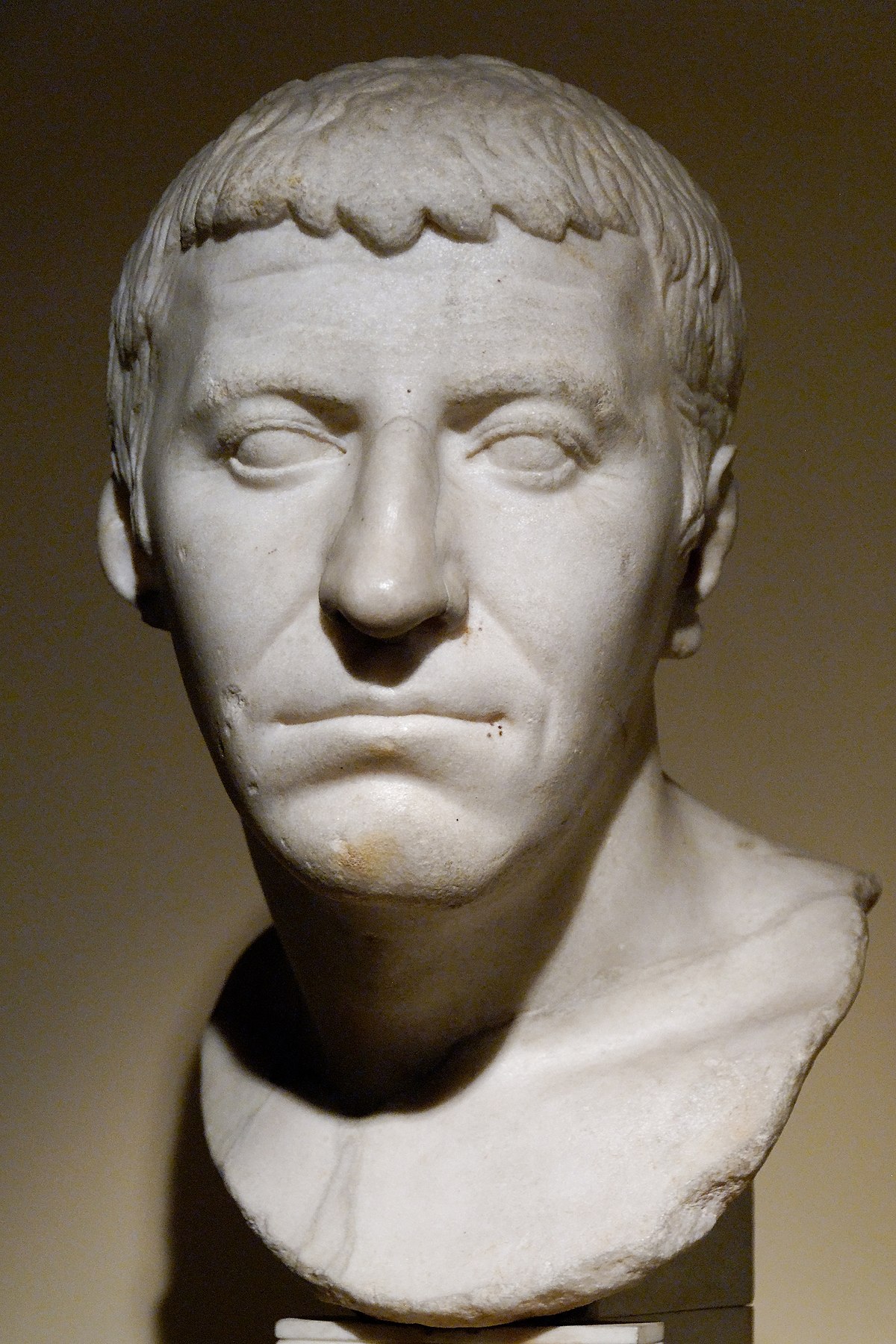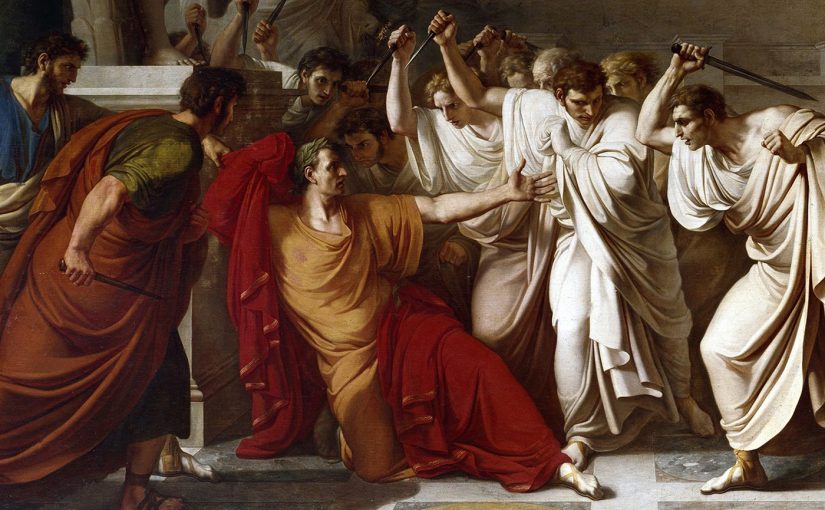In 509BC, the son of the king of Rome raped a noblewoman who then committed suicide. In response, Lucius Junius Brutus staged a coup and overthrew the king, Lucius Tarquinius Superbus. Brutus swore that “no man [should] rule Rome”, establishing the Roman Republic. Brutus became one of Rome’s First Consuls, a position in the Roman Republic where 2 people would share power to keep the other in check with advise from the Senate compromised of 900 Senators, before dying later that year.

It is now 44BC, and a descendant of Lucius, Marcus Junius Brutus, is facing a similar conundrum, about one of his closest friends, Julius Caesar.
Caesar had been a famous general and had many triumphs on the battlefield. He became the richest man in Rome and defeated his rival, Pompey, in a civil war. Caesar had become consul, a position in which he made many popular decisions such as distributing land to the poor, meant that the people of Rome loved him. Senators were also attempting to curry favour with Caesar with numerous accolades, building statues, dedicating temples in his honour and even renaming the month of Quintilis to Julius, a name that eventually transformed into July today.

Many times, Caesar had been granted the role of dictator, someone who held individual power during times of crisis or war. By 44 BC, he had been granted the role of Dictator Perpetuo, meaning that he could remain the sole leader of Rome forever. Many Senators feared a return to the monarchy that they had sworn to never bring back.
A small group of these Senators, calling themselves the Liberators, were plotting an assassination attempt against Caesar. They believed that Caesar was planning on crowning himself King, despite the oath that Lucius Brutus made to Rome. The thought the only way to stop this from happening was by killing Caesar. They had 3 main leaders. One of the most important leaders was Gaius Cassius Longinus.

Cassius was a very accomplished general in the war against the Parthians, and was experienced in naval combat during the civil war with Pompey. Caesar had given him a formal pardon, sending him on a campaign in Egypt. The campaign came up fruitless, and Cassius was ordered to kill any remaining Pompey sympathisers. Julius ordered him to return to Rome and rumours began to circulate that he was planning on putting Cassius in an administrative job in Syria.
Another leader was Decimus Junius Brutus Albinus. Decimus was a diehard Caesarean, having spent 5 years serving under Caesar in Gaul, modern day France. He fought along side Mark Antony and Caesar in the Battle of Alesia. He crushed an uprising during the civil war. He was set to be the governor of Cisalpine Gaul

The third and final lead conspirator was Brutus. Brutus’ choice to join the resistance was not an easy one. After all, Caesar had treated him like a son. In the civil war, he had been on the side of Pompey. Once he lost, he surrendered to Caesar, who saw his talent and appointed him to Cisalpine Gaul, promising him that he could be consul very soon. Brutus’ mother was also in a romantic relationship with Caesar for many years, so had known Caesar for most of his adult life. Caesar was willing to help out his mistress’ son whenever he could. But Cassius’ silver tongue and Brutus’ own fear of what Caesar could do convinced him.

The conspiracy eventually expanded, to 60 senators, which is 7% of the entire Senate, who all believed that Caesar’s authoritarian behaviour was undermining the Senate’s power. They believed that Mark Antony needed to be brought onboard, due to his power as consul. Knowing Caesars popularity, they believed that Antony could call off Caesar’s legions if he was on their side. However, one conspirator, Gaius Trebonius, was a close ally with Antony and had offered him to join a previous conspiracy and Antony had flat out refused. Once Trebonius had revealed Antony’s rejection to the group, the old conspirators, they panicked and disbanded. He concluded there was no purpose in asking him if they already knew the answer. They then proposed Cicero. However, due to him being a strong Caesarean and possibly due to him being 20 years older than most of the other conspirators, they eventually abandoned bringing anyone else in and the plot would go ahead with this team.
As the plotting began, multiple ideas were thrown around. They all agreed that thew assassination needed to be public in order to make a statement. Some suggested assassinating him while he was overseeing that years elections, others suggested killing him on the way there by throwing him over a bridge and stabbing him in the water, others wanted to use the gladiators and have him killed in the Colosseum. Ultimately, many of these plans were considered very risky, and any idea of these plans going ahead were stopped by Caesar suddenly announcing he was leaving Rome on March 18th, to begin a long eastern military campaign. Having thought they had months to plan, they now only had weeks, so all plans were thrown out the window.
While they were plotting the final plan, Cassius suggested the murder of Antony and Marcus Aemilius Lepidus, believing that they may kill the conspirators. Brutus protested saying that they were not there to overthrow the government, and just remove the tyrant. This split the conspiracy into 2 factions, Cassius’ and Brutus’. Eventually they came to a conclusion when Brutus argued that if they ended up killing Caesareans, they would eventually end up repealing Caesar’s highly popular reforms, meaning the Roman people would turn on them. This convinced Cassius that they would go after Caesar and Caesar alone.
Meanwhile, Caesar had been getting concerned. A priest by the name of Spurinna told Caesar to “Beware the Ides of March”, meaning the midpoint of the month March. In this case it was the 15th, the day of the last Senate meeting before Caesar went off on his military campaign. Before the assassination, he had spoken to Cassius. Once Cassius had left, Caesar was worried about Cassius, noting that he looked unwell.
On the 14th, Lepidus invited Caesar and Decimus to his home for dinner and drinks. They sat, drank and chatted, mainly about logistics for the upcoming war against the Parthians and Dacians, that Caesar wuld be departing for soon, with Decimus to follow the next year. Eventually, the conversation turned philosophical before someone asked “What’s the best way to die?” Lepidus and Decimus talked to each other about this for minutes, whilst the unusually quiet Caesar simply observed. When directly asked the same question, Caesar said “Suddenly and unexpected.” Decimus, knowing the plot he was a leading conspirator on, quickly managed to change the subject.
On the morning March 15th 44BC, Caesar was awoken to the sounds of his yelling and screaming wife, Calpurnia. She had told Caesar of a very vivid dream of the roof on their home collapsing, her hands covered in blood and Caesar dead in her arms. Knowing his wife was non-religious and not the prophetic type, he did not think too much of it. But the two could not get back to sleep, so ended up spending hours of the early morning talking. Caesar then complained of being unwell, possibly to do with the drinking the night before and the lack of sleep. Despite this, he had to attend a religious ceremony. At this ceremony, he spotted Spurinna, jokingly crying out “The Ides of March have come!” Spurinna responded coldly “But they have not yet gone”.
After the ceremony, Caesar returned home. Still feeling unwell, he told Antony to cancel the Senate meeting for that day. Decimus, quickly realising that the scheme may unravel, ran over to Caesar’s house, asking why he’d cancelled. Caesar told him why and Decimus responded saying that this meeting was very important. Lying to Caesar’s face, he told him that they were considering reinstating the title of King, wanting Caesar to fill the office. He said that staying home because of his wife’s dreams would be an insult to the Senate, which would mean the bill to make him King would never go ahead. Caesar was eventually dragged out of the house and was walked to the Theatre of Pompey, where the Senate meeting would be held as the main house was under refurbishment.
At the theatre, many Senators were standing around outside, as the meeting was very late. However, Cassius was inside, staring at a large statue of Pompey. Many historians wonder what he was pondering whilst staring at the statue to this day.
Eventually Caesar arrived. Only 200 or 300 out of the 900 senators actually showed up to this senate meeting. That meant that anywhere between 20%-30% of the senators in that room were members of the conspiracy. A signal was given, and a large group of senators rose to their feet. They fanned out and formed a perimeter around Caesar. One of the senator’s reached out, yanking on Caesar’s robe, exposing his bare shoulder. As this happened, a conspirator named Casca, drew out a large dagger, pushing down hard into Caesar’s shoulder. The knife missed but grazed Caesar’s shoulder, drawing blood. Caesar then grappled with Casca, before eventually being broken free and encountering Cassius, who slashed him across his face.
Once the stabbing began, Caesar resisted the attacks, pushing conspirators back. Until one came forward for an attack. This was Brutus. Caesar stopped struggling. In the adaptation of Caesar’s life by William Shakespeare, he wrote that Caesar said “Et tu Brute?”, in English meaning “And you, Brutus?” Many Roman scholars, despite this, cannot exactly determine his last words. Some suggest he said something along the lines of “And you too, child?” meaning in the metaphorical sense that Brutus was like a son to him, or that Brutus was the alleged illegitimate child of Caesar. No matter what his last words were, it is true that once he saw Brutus, he covered his face with his toga and gave up.

Caesar was stabbed 23 times. The first 5 were all substantial attacks, the shoulder graze from Casca, the face slash from Cassius, a stab to the ribs from Casca’s brother, Titedius, a thigh wound from Decimus and a groin stabbing from Brutus. All other 18 wounds occurred while Caesar lay motionless on the floor, with some historians claiming that these were all superficial, as the stab wound to the ribs had already killed Caesar and he was simply bleeding out.
Unfortunately, the conspiracy’s efforts were for nothing, as, due to Caesar’s popularity, the Roman People were outraged at the assassination. They believed that Caesar was a competent, powerful leader and believed the senate to be corrupt. Once news got out, chaos erupted in Rome. Many senators left the city, whilst the conspirators barricaded themselves on the Capitoline Hill. A few days later, Mark Antony delivered a passionate speech at his funeral. The crowd, fuelled with anger and grief, forced the conspirators out of Rome. Many Civil wars erupted due to the power vacuum left by Caesar. Brutus, facing certain defeat in these wars, committed suicide in 42BC. Eventually, the republic was dissolved in 27BC and Rome was ruled by an Emperor.
Brutus’ legacy is judged very differently amongst scholars. Some view him as a hero fighting against a dictatorship, others view him as a coward and traitor to his father figure. In the poem Dante’s Inferno, Brutus was written to be in the 9th circle of Hell, cursed to a fate of being chewed by Satan for all of eternity. But no matter what you think of the man, Brutus’ struggle, between what he believed was better for his country and his people or loyalty to his best friend and the man who practically raised him, is something that will always be relevant.
